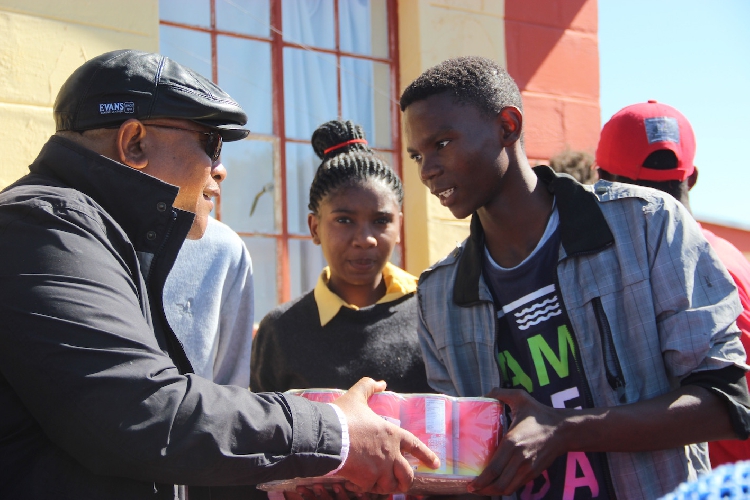THE principal of a school in Omaheke says some parents in the region sell drought relief food meant for their families to raise money for alcohol.
Ben Carpo Geingob, the principal of the Nossob Secondary School, told The Namibian that some parents barter the drought relief food for a traditional brew.
He said this was a cause for concern because some of the schoolchildren depended on these items for a meal.
The Nossob Secondary School is situated at Witvlei village, about 155 kilometres east of Windhoek, and has an enrolment of about 800 pupils, 257 of whom are boarders.
Geingob said some parents also abuse the welfare grants for orphans and vulnerable children paid to them by the gender ministry.
“Many elderly people abuse alcohol. That is taking us backwards. Poverty is being aggravated by alcohol abuse in this area. They can sell those 12 tins of fish for as little as N$50,” he said, pointing to the packets of fish the pupils had just received from Namsov in partnership with the fisheries ministry.
The school received 1 000 packets of fish and soccer balls from the Namsov Community Trust on Saturday.
Geingob said they have tried to address the issue at parents’ meetings, but without success.
“Some of the pupils end up with no school uniforms because their parents and guardians would have spent the money on something else. The pupils end up suffering because most of them stay with grandparents,” he stated.
Geingob’s sentiments were echoed by Omaheke regional education director Pecka Semba, who appealed to parents not to sell or exchange the donated fish for tombo or beer.
“The donors will not be happy if they realise that we sell donations,” Semba stressed.
A Grade 9 pupil at the school, Wycliff Hamaseb, said some parents were taking food from them and selling it to buy alcohol.
The poverty eradication ministry’s permanent secretary I-Ben Nashandi said they were aware of such practices, which were a cause for concern.
He was not aware of this specific case in Omaheke, and although this is a difficult issue to address, they try to encourage the recipients not to sell the food.
Nashandi noted that the ministry has set up street committees comprising unemployed youths from the communities to monitor how beneficiaries of the food bank utilise the donated food.
“We will take measures when that happens. Firstly, we will engage the recipients to persuade them to stop bartering the food, as well as the culprits who offer them money,” he said.
“If all else fails, we will stop giving food to those families involved in selling. Although that is also not the best solution, there would be no other way to address it”, he warned.
Namibia has several programmes to assist the needy, including the food bank, which was launched about two weeks ago by President Hage Geingob in Windhoek.
The food bank initiative at the moment benefits Windhoek households earning less than N$400 per person per month.
Food parcels will be distributed on a monthly basis by street committees comprising unemployed youths from the communities, who will receive a modified basic income grant.
Geingob said the government’s aim is to establish food banks in all towns by next year.
Just last week, justice minister Albert Kawana proposed a referendum on whether the government should ban ‘poisonous’ traditional brews and the sale of alcohol in residential areas.
The ‘Namibia Rural Food Security and Livelihood Vulnerability Forecast’ report recently said the drought currently ravaging Namibia has exposed 729 134 people to food insecurity.
– tuyeimo@namibian.com.na
Stay informed with The Namibian – your source for credible journalism. Get in-depth reporting and opinions for
only N$85 a month. Invest in journalism, invest in democracy –
Subscribe Now!






